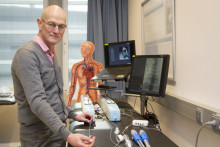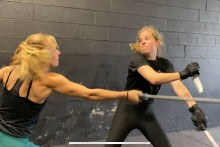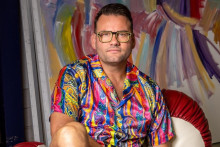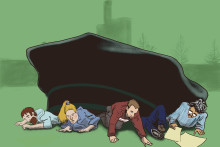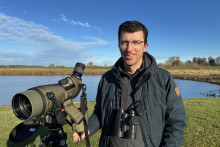Specifically, Bob Geelkerken is the Professor of Clinical Translation of Advanced Technologies Diagnosis and Treatment of Vascular Disorders. ‘I myself have to always look up the exact title,’ smiles Geelkerken. ‘I’m very happy and proud to receive it, but it was never my main goal to become a professor. In my line of work, you should not be respected for your title, but for what you have done for patients and who you are as a person.’
New technology every year
‘I decided to work at the Medisch Spectrum Twente because there is a large vascular practice here with a university nearby, which gives an opportunity to introduce new things,’ says Geelkerken. ‘From the start, my goal was for my team to introduce a new technology in the clinic every year.’
Many years ago, Prof. Geelkerken was asked to give his opinion on the UT study program of Technical Medicine. ‘I replied that its graduates should become members of my team. There are brilliant brains here that come up with many new things and my job is to bring them into real practice. I’m like a translator from real science into medicine,’ thinks Geelkerken. ‘Research within real science is of course completely different from medical research. Science likes complications, because they lead to new research questions, but we don’t want complications at all – that is a disaster for our patients.’
Technical specialists on surgical teams
As Prof. Geelkerken says, the UT research team can do a lot of great work in the benefit of patients and it’s a privilege for him to become a part of this inspiring community. For example, Geelkerken is involved in a project on measuring lactate in the portal vein with magnetic spectroscopy and he has started collaborating with the Organ-on-a-chip group with the goal of mimicking vascular anatomy predicting graft failure. He is naturally also involved in teaching students of Technical Medicine.
‘I’m trying to persuade my colleagues to accept the brilliant graduates of Technical Medicine as equal professionals,’ continues Geelkerken. ‘We are working on establishing a new study program together with the university in Nijmegen, which would allow students to get a double degree in technical medicine and as a medical doctor. Then these technical specialists could finally work on my surgical team. But first we need to provide a lot of support and understanding, because now many people think these young graduates are just technicians and not doctors.’
‘This profession is a way of living’
‘One of my ideals is to help ECTM realize their plans of becoming a leading European training center for technical medicine. At this point, all young Dutch vascular surgeons are already assessed and trained here. You can’t become a vascular surgeon in the Netherlands without going through the training here,’ points out Geelkerken. ‘But my main job is surgery. I love being a surgeon. This profession is a way of living and I recognize the same enthusiasm in researchers here at the university.’


